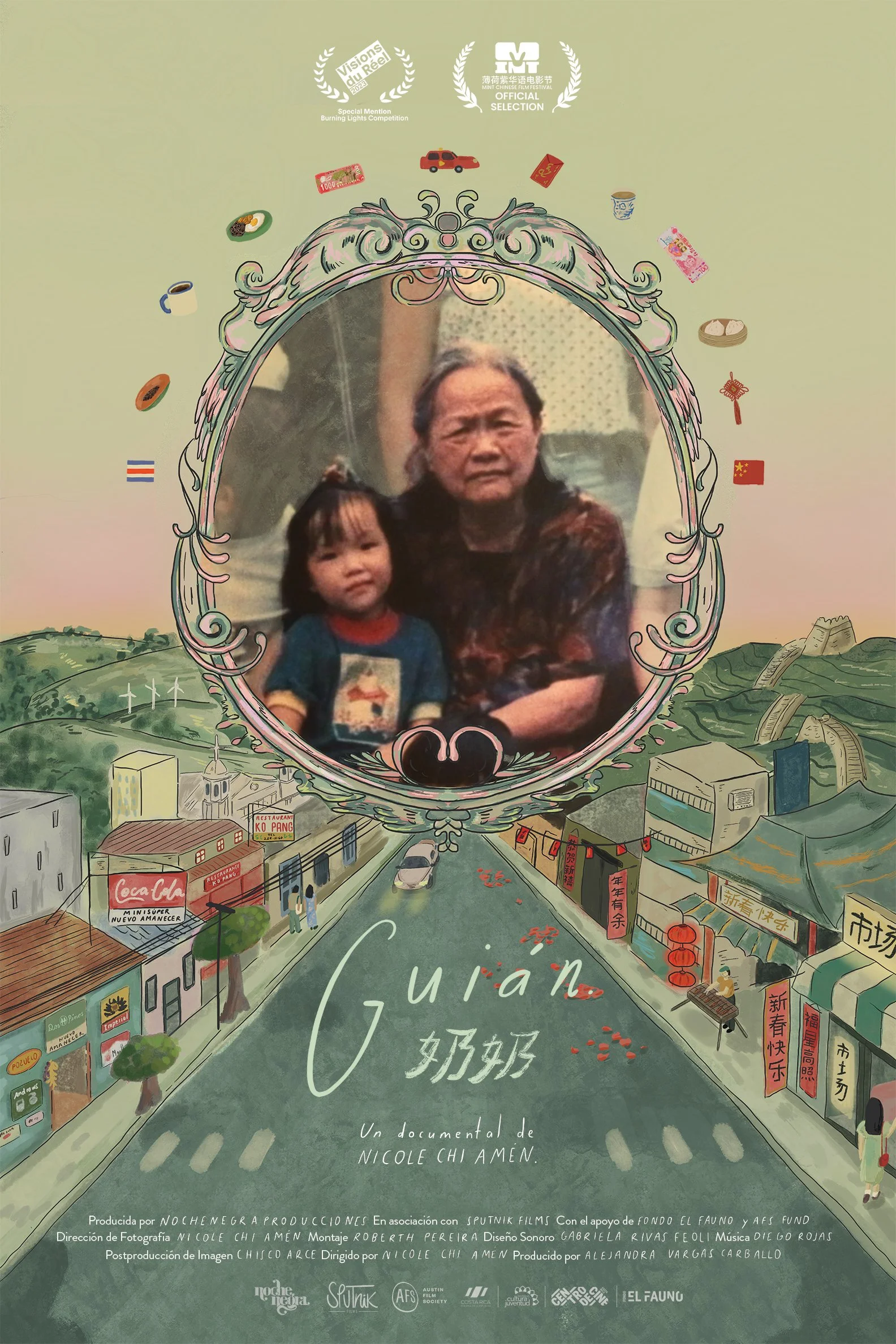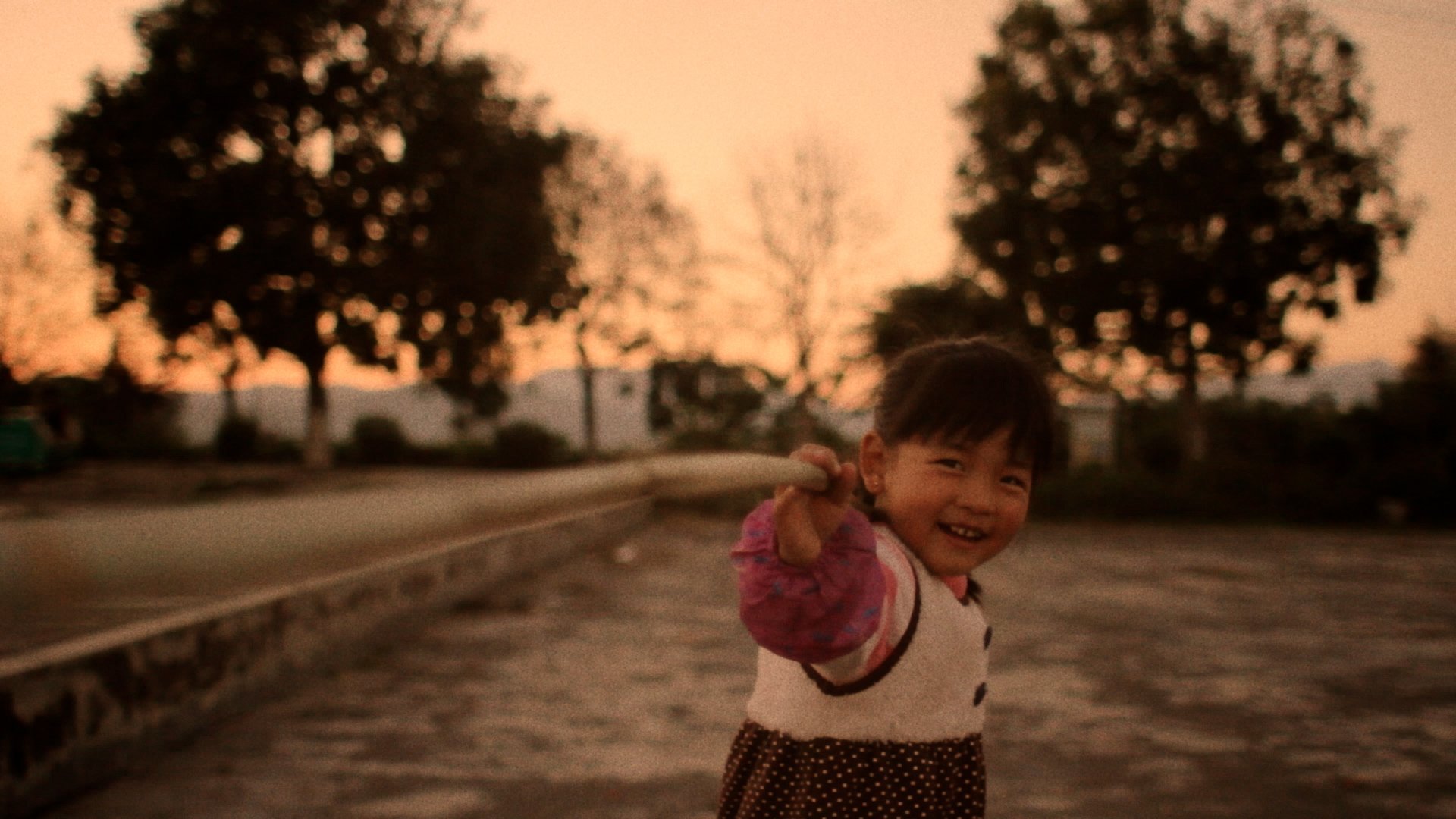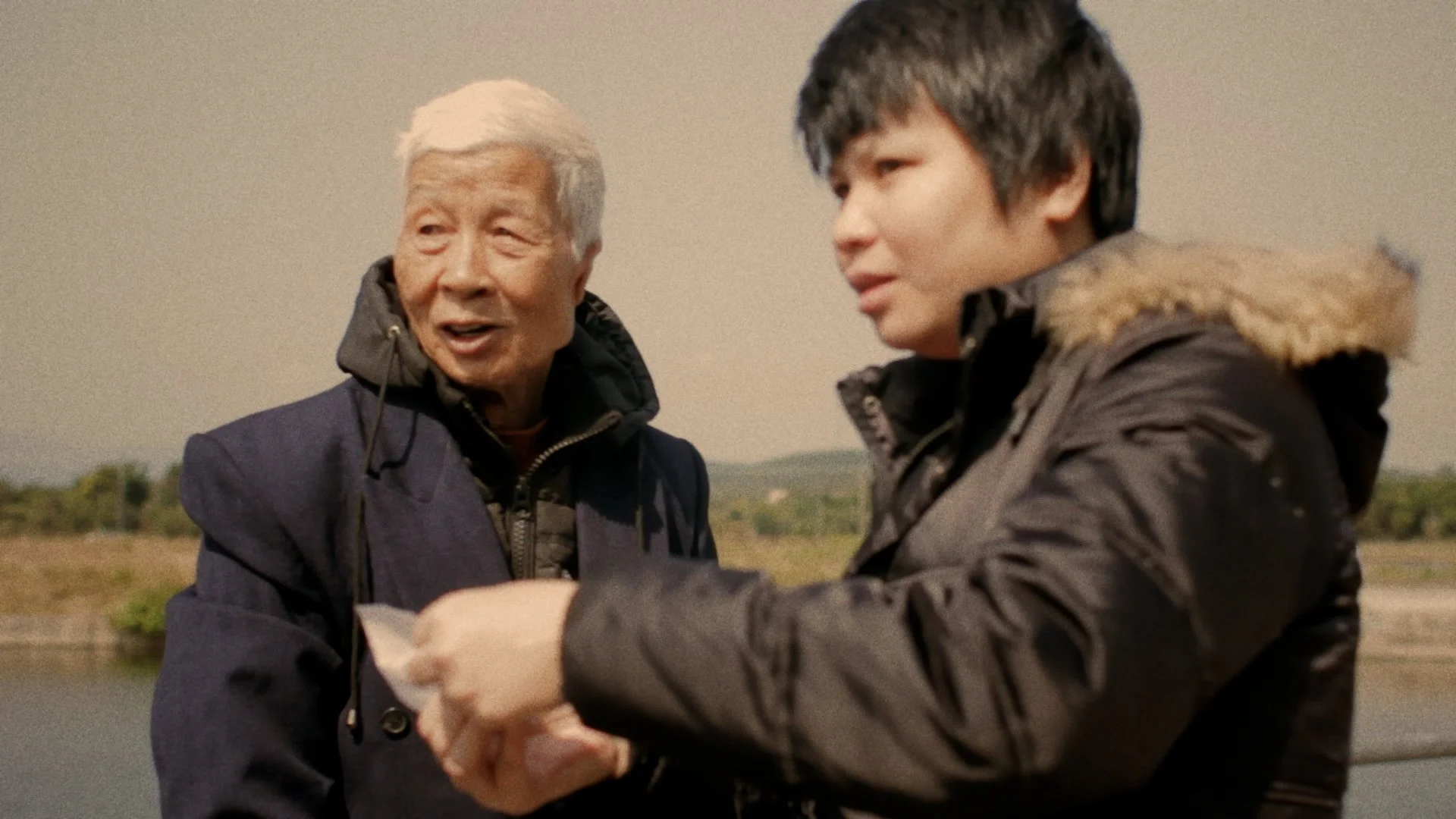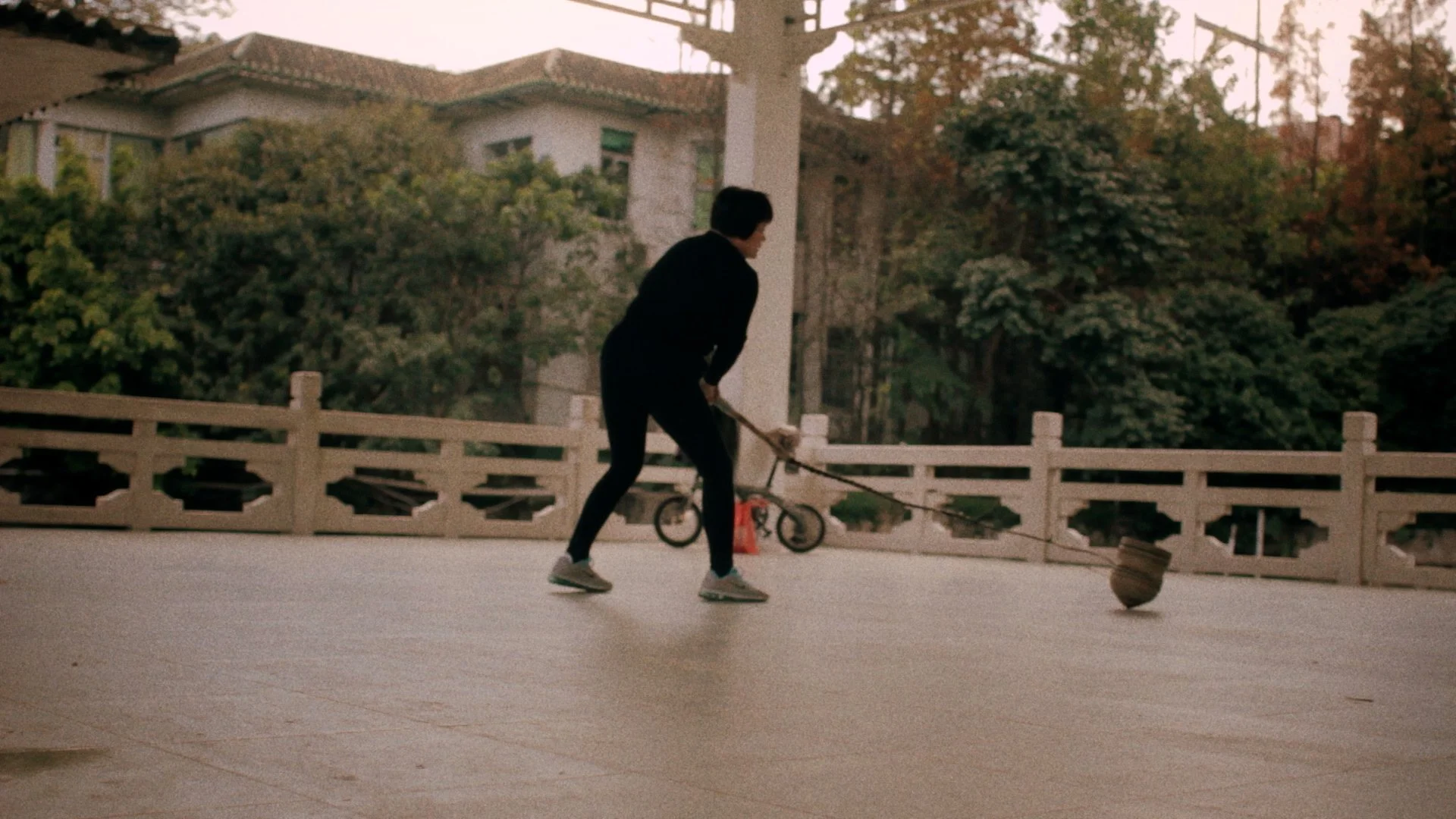Film Review: Guián. A self-discovery journey through love and family
Author: Lucía Muñoz
Translator: Yingjie Wang
English Version Article
Guián (奶奶,2023)
Director: Nicole Chi Amén.
Producers: Alejandra Vargas Carballo.
Screenplay by: Nicole Chi Amén.
Cinematographer: Nicole Chi Amén.
Music by: Diego Rojas.
Synopsis: Nicole Chi decides to investigate her grandmother’s life and roots after her passing. Her journey leads her to China, where she learns not only about her nana’s past, but about her own identity.
Shotgun Commentary: accurate representation of the third-generation-immigrant experience.
Review
Guián is a great story about what it means to be a third generation immigrant. Themes like racism, estrangement, discovery, history and cultural legacy are prominent in the narrative recited by the Costarrican-Chinese director Nicole Chi. She is the narrator and protagonist of the documentary, a tale that begins right after her grandmother’s passing, when she starts wondering about her roots.
The account is absorbing and very illuminating in terms of her experience as the granddaughter of immigrants and how she experiences the cultures of the country that saw her birth and the one that shapes her heritage.
A journey of belonging
The exploration of the hardships of not quite belonging anywhere are very cleverly portrayed through the use of kids and strangers, in this case, taxi drivers. Both groups talk completely unaware of their own racism and prejudices, as well as how their comments or questions might make their interlocutor feel.
While it is not explicitly shared in the piece, the audience can see how the sense of being an outsider in her own country extends to her relatives as well, with something so simple as not knowing that Guián is not the right word to call her mother’s mother. Chi begins to build bridges of knowledge and understanding with the elder members of her family through questions about their past, heritage and language.
Family connections
It is a universal feeling when one loses their grandparents to think of all the things one would’ve liked to ask them about their lives. About their childhoods, if they liked their home growing up, why did they move, etc. So the documentary acts as a reminder of the futility of life and the importance of one’s time with their grandparents. They carry the knowledge of where we come from and all that preceded our existence, so talking to them is one of the best ways to get to know oneself.
All the sections of the film are related to the grandmother and feature interesting facts, stories or general information about the past. However, some of them give the impression of being irrelevant to the chronicle, more so because of the pace of the movie than because of their content.
Slow wins the race?
Some bits of the account had a lot of data packed in a very short amount of time. This results in the inevitable omission of certain parts of the story that is being narrated. In contrast, other parts repeated the same details over and over during a very long period of time, or very simple ideas very slowly. This contradiction in pace and content ultimately feels like driving with the handbrake on, you are advancing, but at a very uncomfortable pace.
ASMR
Another controversial element of the documentary is the narrator. The use of a voice-over is very handy for people who are yet to feel comfortable talking about their intimate thoughts and feelings on camera, as well as to avoid having too much protagonism in a tale. Having a voice to explain what is going on and why, especially when it comes to Chi’s thoughts during an activity or an interview, is a practical and effective way to not lose the audience mid-story.
Nevertheless, Chi’s intonation as a chronicler is very soothing and whisper-like. The speech is calming, but sometimes it works against the narrative itself, since it is very easy as a spectator to lose track and feel sleepy regardless of how interesting what is being transmitted is.
All in all, it is a compelling story slightly sabotaged by certain technical aspects that luckily don’t hold the main attention of the viewer. The amount of information given is very reasonable and relevant, and the images used to show the experience are beautifully presented. Guián constitutes a great example of what life looks like to some third-generation immigrants and the importance of getting to know the diversity of your background.
Advice to take from this movie:
It is important to be aware of how your words might impact others instead of talking thoughtlessly.
Make time for your grandparents, they are invaluable sources of knowledge about who you are.
If someone of your family eats with their mouth open, maybe interview them at some other time..
What's your take? Have you watched Guián? What do you think of her journey? For all of you in the UK, this film will be screened in the 2024 Mint Chinese Film Festival as part of the Feature Competition.
Further info
Guián screening: 3rd February (Saturday), 12:30 at Keswick Alhambra Cinema.
Venue address: 36 St John's St, Keswick. CA12 5AG, UK.
Get Tickets: Keswick Alhambra Cinema
You can now secure the Festival Pass to access the Mint CFF films, events and programmes with a 50% discount.🔗 Find more information about what you can enjoy from the Festival Pass at festival website: unicornscreening.com/passes-tickets-2024
See you there!
And, as usual, don’t hesitate to let me know your thoughts on Guián in the comments section below or leave a message in my contact page! For more reviews and cinema-related articles check out the rest of my blog! :D
For more updates, chatting and additional content, don't be shy! Check out my social media and connect!
中文版文章:《奶奶》——由爱与家庭抵达自我
作者:Lucía Muñoz
翻译:王颖洁
奶奶 (2023)
导演:妮可·奇·艾曼 Nicole Chi Amén
制片:亚历杭德拉·巴尔加斯·卡巴洛 Alejandra Vargas Carballo
编剧:妮可·奇·艾曼 Nicole Chi Amén
摄影:妮可·奇·艾曼 Nicole Chi Amén
音乐:迪亚哥·罗哈斯 Diego Rojas
梗概:姥姥去世后,妮可·奇决定去了解她的生平,由此踏上了“寻根之旅”。这趟旅程去到了中国。在那里,妮可不仅知晓了姥姥的过去,还对自己的身份有了更深的认识。
快评:影片准确展现了第三代移民的经历。
影评
《奶奶》极为出色地讨论了第三代移民的身份认同问题。在哥斯达黎加华裔导演妮可·奇的叙述中,种族主义、隔阂、探索、历史和文化遗产等主题十分突出。妮可是这部纪录片的叙述者和主人公。整个故事紧接着她因姥姥去世而开始思考自己的“根”展开。
影片涉及她作为第三代移民的经历以及出生地的文化对她个人的影响,叙事新颖、引人入胜。
寻找归属之旅
影片通过两组人巧妙描绘了寻找归属的艰辛:孩童和陌生人,后者在影片中具体表现为出租车司机。两组人在表达时完全意识不到自己的种族主义和偏见,以及他们的评论或问题会让与他们交谈的人作何感想。
虽然影片没有明确表述,但观众可以感受到作为自己国家外来者的感受是如何从自身延伸至亲人的。这体现在一些很简单的事上,比如Guián是“奶奶”而非“姥姥”的意思。通过询问家中长辈的过去、传统与语言,妮可开始对他们有了了解,和他们建立起了链结。
家庭链结
当祖父母或外祖父母去世后,一个人会想到所有自己本应该问的关于他们人生的问题,这是人之常情。这些问题包括他们如何度过童年、是否喜欢自己成长的地方、为何搬家等等。因此,这部纪录片提醒了观众生命中的诸多徒劳以及和祖父母一辈相处的意义。那一辈人知道我们从何而来,知道我们出生之前的事,所以和他们交谈对我们了解自己非常有帮助。
整部电影都和妮可的姥姥有关,同时又有一些有趣的史实、故事,以及其他和过去相关的信息。然而,有些信息让人感觉和影片的整体叙事无关,原因大抵不在这些信息本身,而在于影片的节奏。
慢节奏一定对吗?
电影中有些片段的信息密度很大,这会让观众不可避免地漏掉一些内容。但又有些部分会一遍一遍地重复相同的细节,持续很长时间,或是非常缓慢地表达简单易懂的想法。这种节奏和内容上的矛盾就像是拉着手刹开车,车的确在向前移动,但速度让人很不舒服。
对画外音的处理
这部纪录片的另一个争议点在于叙述者。在拍摄对象为不习惯在镜头前谈论自己内心想法和感受的人时,使用画外音会很有用,而且可避免让故事太过集中在某个人上。经由画外音,画面得到解释。这是保持观众注意力实用又有效的方法,在影片处理妮可从某个活动或采访中产生的想法时尤为如此。
然而,妮可作为记录者和叙述者,她的语调非常舒缓,如耳语一般。妮可的平静有时与叙事本身相悖,因为不论叙述的内容有多有趣,她的语调都很容易让观众走神、昏昏欲睡。
但瑕不掩瑜,这些技术方面的问题不足以让观众对故事本身丧失兴趣。影片传递的信息数量合理、内容相关,对影像的使用也恰到好处。由此,这部电影极佳地展现了第三代移民的生活,同时表明了了解自身背景多样性的意义。
从这部电影中得到的建议:
要对自己的言语可能对他人的影响有所意识,不要轻率地说话。
和祖父母一辈多些相处,他们对你认识你自己很重要。
如果你的家人中有吃饭时张嘴咀嚼的人,别在他们吃饭时进行采访。
展映信息
展映时间:2024年2月3日(周六)12:30
展映地点:Keswick Alhambra Cinema, 36 St John's St, Keswick CA12 5AG, 英国
您现在可以购买电影节通行证,以50%的折扣享受薄荷紫华语电影节电影、活动和节目。🔗 在电影节网站上查找有关通行证的更多信息:unicornscreening.com/passes-tickets-2024












